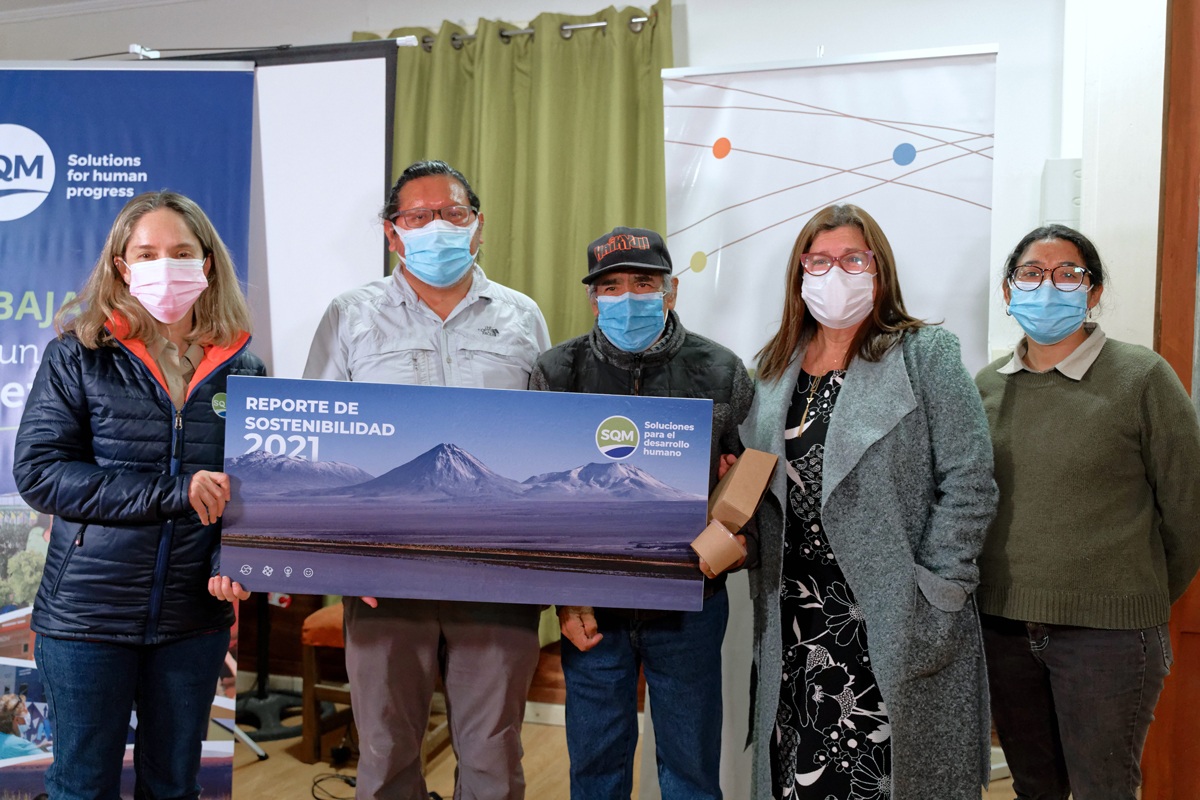News
SQM Presents Sustainability Report in El Tamarugal Communities

Towns in the municipalities of Pozo Almonte and Huara participated in a cycle of presentations given by company executives, who provided medium- and long-term numbers, achievements and challenges for the company.
From northern Chile, SQM’s production gives life to five lines of business with world leadership: iodine, lithium, potassium, industrial chemicals and specialty plant nutrition, reaching nearly 110 countries and attaining a total sales revenue of ThUS$2,862,315 in 2021.
These numbers and the various goals achieved last year were shared with various communities in the Tarapacá Region, through spaces for dialogue where the 2021 Sustainability Report was presented, led by SQM Director of Iodine Nitrate Communities and Public Affairs, Pablo Pisani.
Neighbors from Colonia Agrícola de Pintados, La Tirana, Victoria, Huara, Bajo Soga and Pisagua came to learn about the work of the chemical company that currently has more than 6,000 workers in Chile and around the world.
“We are very happy because through this report we are sharing what we have done throughout the year, which translates into solid endeavors in terms of sustainability, keeping in tune with the communities near our operations. We have achieved this relationship through working groups where we reflect a team commitment, contributing to solving the problems and needs of the towns in Tarapacá,” Pisani shared during his presentation.
The company has been working with the communities of Tarapáca for 13 years, co-creating development projects on renewable energy for water extraction, road improvements and educational, agricultural and livestock challenges faced by the families in the area.
Edwin Moscoso, president of the Asociación Juventud del Desierto, highlighted the presentation of the 2021 Sustainability Report, notably the transparency of SQM’s management, “because they share the connection and relationship they have with each community, which is always good to know about. We highly value this presentation and we are grateful to the company, because we have been able to carry out important initiatives for our community, both in terms of social and agricultural issues.”
During the presentation, the executive highlighted the company’s main statements, ratifying the commitment to reduce brine extraction by 50% by 2028, a process that began in November 2020. He reiterated the company’s intention to reduce its freshwater consumption by 40% by 2030 and 65% by 2040, based on 2020 projections, and its determination to make all of its products carbon neutral by 2040.
In this context, Claudio Yampára, President of the Cooperativa Misky Uma in Bajo Soga, expressed his confidence in the working group that they formed a few months ago with the company. “I am convinced that we will do a great job. We are eight entities from this area of Bajo Soga. Our main objectives are to strengthen our agricultural areas, and we are already seeing some projects such as road improvements, which will make it easier to transport our products,” he added.
Angélica Tito, social leader from Huara, pointed out that the company “started from scratch to work with our community, involving us in all their progress regarding the Orcoma project. They have given us the opportunity to be part of various initiatives. What interests us most as leaders is to learn about what the company does. This is called integration, and it is how we should work together with the private sector and it is very positive that they can come into our community with the door wide open.”
José Bartolo, Mayor of Huara, thanked the company for the invitation, pointing out that “it is always important for private companies to be transparent about what they are doing, to keep us informed and to clarify concerns. We hope that as a community we can continue to grow together with educational, agricultural and heritage projects that we can generate in conjunction with the company. Technological development in mining makes for a sustainable industry.”
For the thirteenth year in a row, SQM’s 2021 Sustainability Report follows the principles of the Global Reporting Initiative (GRI), based on its Responsible Business Strategy, Sustainability, Ethics and Human Rights Policy, environmental, social and productive goals and commitments.
